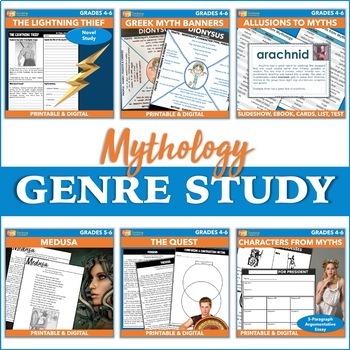Greek Mythology Unit - Myth Genre Study for Upper Elementary & Middle School
Brenda Kovich
5.8k Followers
Grade Levels
4th - 6th, Homeschool
Subjects
Resource Type
Standards
CCSSRL.4.1
CCSSRL.4.3
CCSSRL.4.4
CCSSRL.4.6
CCSSRL.4.9
Formats Included
- Zip
- Easel Activity
Pages
243 pages
Brenda Kovich
5.8k Followers

Includes Google Apps™
This bundle contains one or more resources with Google apps (e.g. docs, slides, etc.).
Easel Activities Included
Some resources in this bundle include ready-to-use interactive activities that students can complete on any device. Easel by TPT is free to use! Learn more.
What educators are saying
I loved this unit. My students loved the activities and it went so well with my Percy Jackson read aloud.
This resource involves no prep and is easy to use. My students were engaged with this bundle's many differentiated activities. Students were accountable for their assigned reading.
Products in this Bundle (8)
showing 1-5 of 8 products
Bonus
Greek Mythology Lesson Plans & Story Arc
Description
This five-week myth-themed unit will captivate your upper elementary or middle school students. A Greek mythology genre study has been planned for you! It includes a novel study, critical thinking and literature activities, vocabulary, writing, and more!
Open the individual previews to get a better look.
Kids will:
- Conduct a novel study.
- Research gods, goddesses, creatures, and mortals.
- Analyze perspectives of two pieces of literature with the same topic.
- Use critical thinking to develop a definition of the quest.
- Learn 40 allusions to Greek myths.
- Write two five-paragraph argumentative essays.
Everything you need is included:
- Lesson Plans - Five weeks of plans will inspire you to build the best unit ever. (Grab this free resource. It's a great way to get started!)
- The Lightning Thief – Students follow the adventures of Percy Jackson. It includes lesson plans, background information, 22 chapter worksheets, and additional materials.
- Banners – Each student researches a different character from mythology and creates a banner. (36 characters are included.)
- Medusa – Focusing on perspective, students read two pieces of literature about Medusa: a humorous poem and a brief narrative. Then they can write character descriptions, identify point of view and describe how it influenced events, compare viewpoints, and/or write an original piece.
- The Quest – Kids learn about the hero’s journey. After reading two myths, “Perseus” and Theseus,” they find similarities and differences, determine the pattern of events, and define “hero’s quest.” For an added challenge, students can study scholarly models of the monomyth, refine the original list, chronicle stages in a different character’s quest, and/or write an original story using a similar plot.
- Allusions to Greek Mythology – Students learn 40 allusions and take a test. Resources include a list of terms and definitions, a slideshow, an eBook, note-taking sheets, cards, a Quizlet set, and an assessment.
- Argumentative Writing – Two writing activities culminate your unit. First, kids write five-paragraph opinion essays about which god or goddess to invite to dinner. Next, they compose multi-paragraph persuasive texts on which character to elect as president.
These activities are great for most fifth and sixth grade students. You can also use them with high fourth graders or students in upper grades who struggle with reading.
Enjoy teaching mythology in your classroom or homeschool!
Brenda Kovich
Total Pages
243 pages
Answer Key
Included with rubric
Teaching Duration
1 month
Report this resource to TPT
Reported resources will be reviewed by our team. Report this resource to let us know if this resource violates TPT’s content guidelines.
Standards
to see state-specific standards (only available in the US).
CCSSRL.4.1
Refer to details and examples in a text when explaining what the text says explicitly and when drawing inferences from the text.
CCSSRL.4.3
Describe in depth a character, setting, or event in a story or drama, drawing on specific details in the text (e.g., a character’s thoughts, words, or actions).
CCSSRL.4.4
Determine the meaning of words and phrases as they are used in a text, including those that allude to significant characters found in mythology (e.g., Herculean).
CCSSRL.4.6
Compare and contrast the point of view from which different stories are narrated, including the difference between first- and third-person narrations.
CCSSRL.4.9
Compare and contrast the treatment of similar themes and topics (e.g., opposition of good and evil) and patterns of events (e.g., the quest) in stories, myths, and traditional literature from different cultures.





